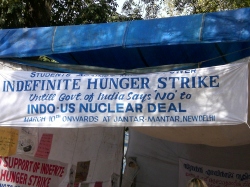 “We’re on our 8th day of fasting,” said one of the students from Calicut University, Calicut, Kerela. “We don’t want nuclear to be a part of our future.” Several students including Abdul Rehman, Saji Mathew, Ramziya Rehmat, Tomy Jecob, Krupa and Divya, inspired by one of their professors came all the way from the southern state of Kerela up to the seat of power in Delhi to voice their concerns regarding the long-pending Indo-US nuclear power deal. They are members of the Students Against Nuclear Power (S.A.N.P) group.
“We’re on our 8th day of fasting,” said one of the students from Calicut University, Calicut, Kerela. “We don’t want nuclear to be a part of our future.” Several students including Abdul Rehman, Saji Mathew, Ramziya Rehmat, Tomy Jecob, Krupa and Divya, inspired by one of their professors came all the way from the southern state of Kerela up to the seat of power in Delhi to voice their concerns regarding the long-pending Indo-US nuclear power deal. They are members of the Students Against Nuclear Power (S.A.N.P) group.
The Indo-US Nuclear deal, also known as the “1, 2, 3” Deal has been full of controversy ever since its inception. Though first started by the NDA government of the late 90s and early 2000, it has reached its final stages under the current UPA-led coalition. The deal is significant for many reasons but mostly for its implications of India finally being deemed a “responsible nuclear power” status by the US–bringing the country out of official isolation on the subject. It is important to note that India has not signed the non-proliferation treaty.
The deal is being mooted crucial for India in terms of energy security as the nation currently imports 70% of its oil, which is expected to go up to 90% by mid-century if not sooner. India currently lacks supplies of uranium and the deal would allow technology sharing and the ability to buy uranium from the global market for the very first time. India’s plans are to utilize home grown technology, particularly the fast-breeder closed cycle process which involves enriching some thorium (of which conveniently India has some 30-odd percent of the global supply) with uranium to start the closed cycle. If India is to maintain its economic boom, it is expected that it will have to increase its energy production from the 125 gigawatts today to over 250 gigawatts by 2016. It is debatable however, how much of this will actually be achieved by boosting nuclear energy generation. Critics state that nuclear will still play a very small role in the over all energy mix. Continue reading →
cycle process which involves enriching some thorium (of which conveniently India has some 30-odd percent of the global supply) with uranium to start the closed cycle. If India is to maintain its economic boom, it is expected that it will have to increase its energy production from the 125 gigawatts today to over 250 gigawatts by 2016. It is debatable however, how much of this will actually be achieved by boosting nuclear energy generation. Critics state that nuclear will still play a very small role in the over all energy mix. Continue reading →



